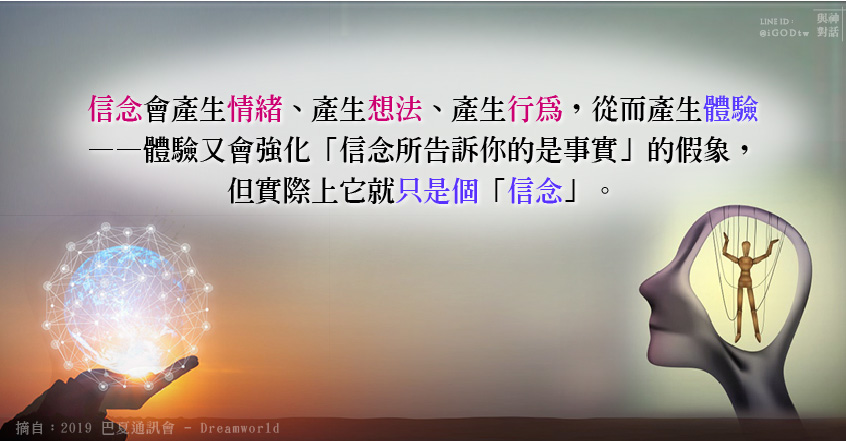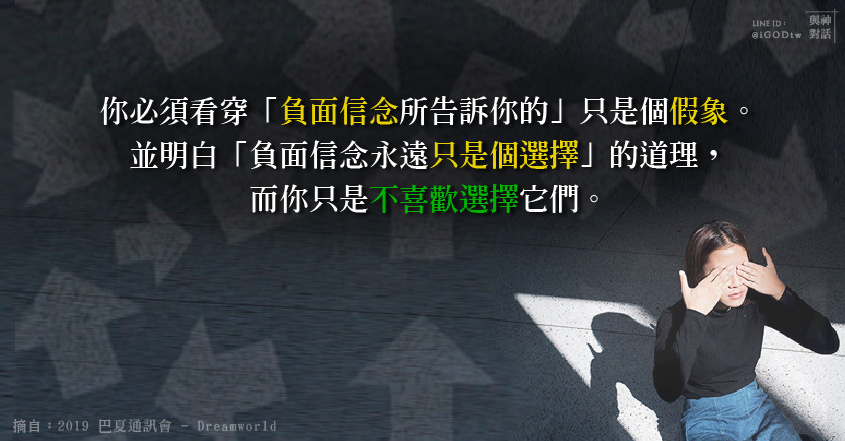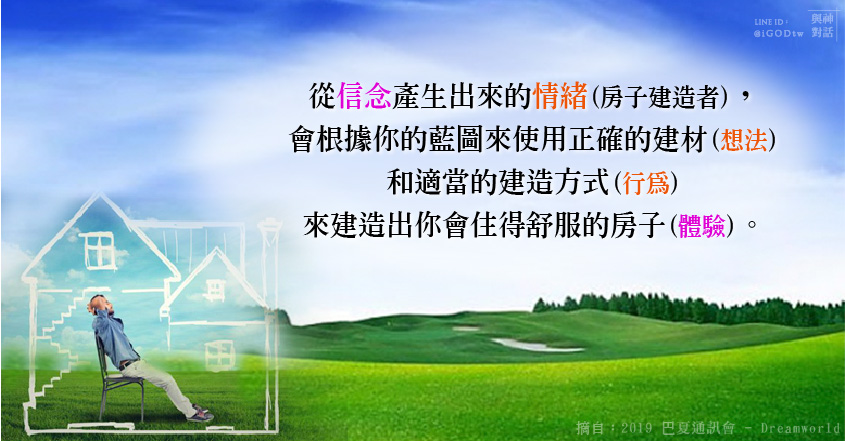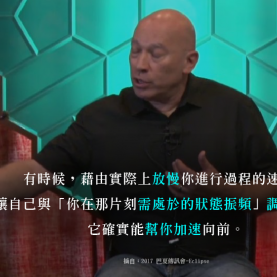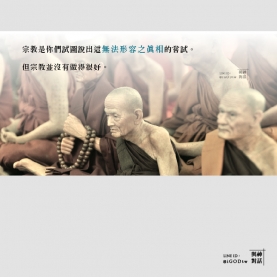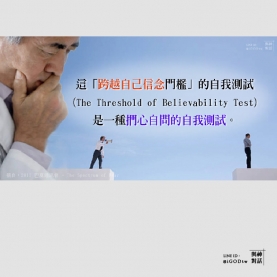巴夏精選短片(4分12秒)【看見人類情緒→想法+行為→體驗如何運作的藍圖】Bashar664
片名:【看見人類情緒→想法+行為→體驗如何運作的藍圖】
What are thoughts? How they work in human life?
影片摘自:2019-Dreamworld
中文翻譯:Jimmy

此篇內文:
What is… what are thoughts?
什麼是「想法」?
什麼是「想法」?
Thoughts are one of the ways that the belief system uses the physical mind to reinforce their validity so that they can perpetuate themselves.
想法是「信念系統」為了讓自己得以長久延續而利用物質心智(頭腦)來強化它們的合理性的(其中)一種方式。
In other words, belief systems have a certain structure.
也就是說,信念系統具有某種結構(是某特定結構運作中的一項重要工具)。
Since physical reality isn't really real, beliefs have to make you believe that they are.
因為(就靈魂的意識層次)物質實相並非真正「真實」的,所以「信念」(這工具)必須要能夠讓你相信物質實相是真實的。
And therefore they have to reinforce themselves to make you think that physical reality is solid and real.
因此,信念(的本質和運作模式)必須是自我強化式的,以讓你認為:物質實相是扎扎實實的、真實的。
Therefore, beliefs will generate emotions, they will generate thoughts, they will generate behaviors, and thus generate experiences to reinforce the “reality” of what the belief is telling you is a “fact”, when in fact it's nothing more than a belief.
因此,信念會產生情緒、信念會產生想法、信念會產生行為,從而產生體驗——體驗又會強化「信念所告訴你的是事實」的假象,但實際上它就只是個「信念」。
But they have to do that in order for you to have a physical experience.
但是,它們(信念)必須這樣運作才能讓你在物質實相中得以體驗。
Otherwise, if you didn't believe them, you would not be able to actually maintain a physical experience.
否則,如果你不相信那些「你的信念」,那麼你在物質實相中就沒辦法真正維持一種「(屬於你的)體驗」。
You would see right through the illusion that your consciousness is creating.
你會直接看穿那些你意識製造出來的幻覺假象。
Now, when positive beliefs do that, you usually don't mind,
當正向的信念被強化的時候,你們通常不會介意,
but the negative beliefs have to use negative reinforcement. That's just the way they're designed.
但是負面的信念就必須用負面消極的方式,來強化它們自己。因為那是它們被設計成的本質和功能。
So in order to perpetuate themselves as a negative belief, they will usually do things and use tools and techniques in your emotions, in your thoughts, and in your behaviors to make sure you don't let them go.
所以負面信念為了將自己得以永久存在,它們通常會在你的情緒、想法和行為上做一些事,並使用一些手段和技巧,以確保你不會輕易放掉它們。
So one of the techniques they often use is fear.
而負面信念最常使用的技巧之一就是「恐懼」。
They make you afraid that if you let them go and stop believing in what they're telling you that something worse will happen.
它們會讓你害怕「如果你放掉它們而不再相信它們所告訴你的」的話,會有更糟的事情發生。
That's just an illusion. It's just the way they work.
它們所告訴你的只不過是個幻覺。那只是負面信念運作的方式。
You have to see through that as an illusion.
你必須看穿「負面信念所告訴你的」只是個假象。
Make sense?
聽懂這道理嗎?
It does. And I'm… but now I'm wondering like… are they… they're unavoidable then?
有道理。但現在我想知道……這麼說來…..負面信念是無可避免的嗎?
Because they help us create like… physical experiences?
因為它們在幫助我們「創造」,例如像,物質實相中的體驗。
Yes, but the idea is to then get to a place where you are in balance with yourself so that you can simply allow yourself to hold on the positive beliefs,
是的,但這個概念是,讓自己處於內心平衡的狀態,以讓自己能夠單純地抱持正面的信念,
knowing that the negative beliefs are always there as a choice, but you simply don't prefer to choose them.
並明白「負面信念永遠只是個選擇」的道理,而你只是不喜歡選擇它們。
You're not validating them. You simply recognize that they're there as an equal choice to anything you could believe is true,
你沒有讓那些負面信念對你生效(使它們對你有效)。你只是「認出」它們只是一個選擇——就像任何你可能信以為真的東西那樣。
and you simply choose what you prefer without invalidating what you don't prefer.
而你只是選擇了「你喜歡的」(信念),而不去否定、批判或毀謗那些「你不喜歡的」。
Yes, I understand. And…
好的,我明白。
And when you experience a behavior, have an experience; experience a behavior, have a thought, have a feeling- you know that it is the belief generating all those
而當你經歷了一個行為,擁有了一個體驗;體驗了一個行為,而產生了一個想法、產生了一個感受——你知道,這一切都是由「信念」產生出的。
Because you cannot have a feeling or a thought or a behavior and experience in a vacuum. You have to believe something to be true first.
因為:你無法無中生有一個感受、想法、行為或體驗。你必須先有一個「你已信以為真」的信念(才會產生它們)。
It's the blueprint.
這就是(人類「信念→情緒和想法→行為→體驗→感受」如何)運作的藍圖:
The emotions are the builders of the house, the thoughts are the building materials that they use; the behaviors are the way the builders are building the house, and the experience is the house that was built that you live in.
「情緒」是房子的建造者,「想法」是情緒使用的建材;「行為」是情緒蓋這房子的方式,「體驗」則是情緒建造出來你入住的房子。
So, if something is off-kilter with the house and you don't feel comfortable in it, go back to the blueprint and look at the blueprint says:
所以,如果房子裡有什麼東西失衡了,而你住在裡面不舒服,那就回去看看那房子的藍圖,然後說:
“Oh, yes, I see the blueprint is off here, and off there. Let me put that back into alignment.”
「噢,沒錯,我看到藍圖的這裡不對勁,那裡也不對勁。讓我來把它們導回正軌!」
Now, the emotions that are generated by the beliefs to reinforce themselves as real will follow the blueprint and build the house with the correct building materials, in the proper method of building, and they will build the house that you will be comfortable living in.
現在,從信念產生出來而為了強化它自身真實性的「情緒」(建造者),會根據你的藍圖來使用正確的建材(想法)、適當的建造方式(行為)來建造出你會住得舒服的房子(體驗)。
Always go back to the blueprint. Always go back to the belief system. That's what generates it to begin with.
永遠是回去檢視你房子的藍圖,永遠是回到你的信念系統。那是產生你情緒、想法、行為和體驗的源頭。
So you use emotions and thoughts and behaviors and experiences to ask:
因此,利用(常有意識地覺察)你的情緒、想法、行為和經驗來自問:
“What would I have to believe is true about myself in this circumstance in order to feel, think, behave, experience what I am feeling, thinking, behaving, experiencing?”
「我到底已經深信了什麼,才會讓我在這情境下感覺、認為、做出和體驗到我此刻的感受、想法、行為和經驗?」
Then you can always trace it back, make the adjustments, and have a different experience.
那麼你就能夠追溯回去,做出調整,並擁有不一樣的體驗。
Because everything starts with the belief, everything starts with the definition you buy into as true.
因為,一切都源自於「信念」,一切都始於你已深植的「定義」。
